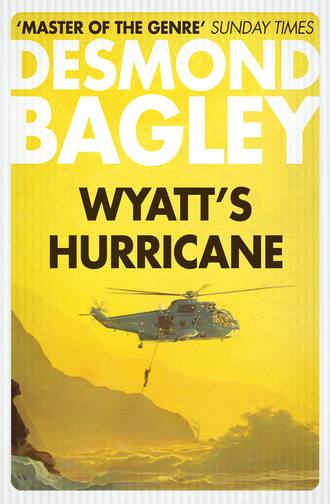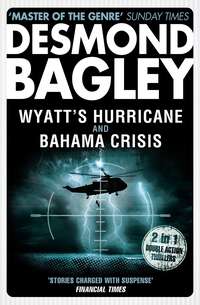
Полная версия
Wyatt’s Hurricane
‘You’ve told Commodore Brooks, of course,’ said Wyatt idly.
‘Er … he knows about Mabel… yes.’
‘He knows all about Mabel?’ asked Wyatt sharply. ‘The type of hurricane she is?’
‘I’ve given him the usual routine reports,’ said Schelling stiffly. He leaned forward. ‘Look here, Wyatt, you seem to have an obsession about this particular hurricane. Now, if you have anything to say about it – and I want facts – lay it on the line right now. If you haven’t any concrete evidence, then for God’s sake shut up and get on with your job.’
‘You’ve given Brooks “routine” reports,’ repeated Wyatt softly. ‘Schelling, I want to see the Commodore.’
‘Commodore Brooks – like Serrurier – has no time at the present to listen to weather forecasts.’
Wyatt stood up. ‘I’m going to see Commodore Brooks,’ he said obstinately.
Schelling was shocked. ‘You mean you’d go over my head?’
‘I’m going to see Brooks,’ repeated Wyatt grimly. ‘With you or without you.’
He waited for the affronted outburst and for a moment he thought Schelling was going to explode, but he merely said abruptly, ‘Very well, I’ll arrange an appointment with the Commodore. You’d better wait in your office until you’re called – it may take some time.’ He smiled grimly. ‘You’re not going to make yourself popular, you know.’
‘I haven’t entered a popularity contest,’ said Wyatt evenly. He turned and walked out of Schelling’s office, puzzled as to why Schelling should have given in so easily. Then he chuckled bleakly. The reports that Schelling had given Brooks must have been very skimpy, and Schelling couldn’t afford to let him see Brooks without getting in his version first. He was probably with Brooks now, spinning him the yarn.
The call did not come for over an hour and a half and he spent the time compiling some interesting statistics for Commodore Brooks – a weak staff to lean on but all he had, apart from the powerful feeling in his gut that disaster was impending. Brooks would not be interested in his emotions and intuitions.
Brooks’s office was the calm centre of a storm. Wyatt had to wait for a few minutes in one of the outer offices and saw the organized chaos that afflicts even the most efficient organization in a crisis, and he wondered if this was just another exercise. But Brooks’s office, when he finally got there, was calm and peaceful; Brooks’s desk was clean, a vast expanse of polished teak unmarred by a single paper, and the Commodore sat behind it, trim and neat, regarding Wyatt with a stony, but neutral, stare. Schelling stood to one side, his hands behind his back as though he had just been ordered to the stand-easy position.
Brooks said in a level voice, ‘I have just heard that there is a technical disputation going on among the Meteorological Staff. Perhaps you will give me your views, Mr Wyatt.’
‘We’ve got a hurricane, sir,’ said Wyatt. ‘A really bad one. I think there’s a strong possibility she may hit San Fernandez. Commander Schelling, I think, disagrees.’
‘I have just heard Commander Schelling’s views,’ said Brooks, confirming the suspicions Wyatt had been entertaining. ‘What I would like to hear are your findings. I would point out, however, that pending the facts you are about to give me, I consider the possibility of a hurricane hitting this island to be very remote. The last one, I believe, was in 1910.’
It was evident that he had been given a quick briefing by Schelling.
Wyatt said, ‘That’s right, sir. The death-roll on that occasion was 6,000.’
Brooks’s eyebrows rose. ‘As many as that?’
‘Yes, sir.’
‘Continue, Mr Wyatt.’
Wyatt gave a quick résumé of events since Mabel had been discovered and probed. He said, ‘All the evidence shows that Mabel is a particularly bad piece of weather; the pressure gradient is exceptional and the winds generated are remarkably strong. Lieutenant-Commander Hansen said it was the worst weather he had ever flown in.’
Brooks inclined his head. ‘Granted that it is a bad hurricane, what evidence have you got that it is going to hit this island? I believe you said that there is a “strong possibility”; I would want more than that, Mr Wyatt – I would want something more in the nature of a probability.’
‘I’ve produced some figures,’ said Wyatt, laying a sheaf of papers on the immaculate desk. ‘I believe that Commander Schelling is relying on standard theory when he states that Mabel will not come here. He is, quite properly, taking into account the forces that we know act on tropical revolving storms. My contention is that we don’t know enough to take chances.’
He spread the papers on the desk. ‘I have taken an abstract of information from my records of all the hurricanes of which I have had personal knowledge during the four years I have been here – that would be about three-quarters of those occurring in the Caribbean in that time. I have checked the number of times a hurricane has departed from the path which strict theory dictates and I find that forty-five per cent of the hurricanes have done so, in major and minor ways. To be quite honest about it I prepared another sheet presenting the same information, but confining the study to hurricanes conforming to the characteristics of Mabel. That is, of the same age, emanating from the same area, and so on. I find there is a thirty per cent chance of Mabel diverging from the theoretical path enough to hit San Fernandez.’
He slid the papers across the desk but Brooks pushed them back. ‘I believe you, Mr Wyatt,’ he said quietly. ‘Commander, what do you say to this?’
Schelling said, ‘I think statistics presented in this way can be misused – misinterpreted. I am quite prepared to believe Mr Wyatt’s figures, but not his reasoning. He says there is a thirty per cent chance of Mabel diverging from her path, and I accept it, but that is not to say that if she diverges she will hit San Fernandez. After all, she could go the other way.’
‘Mr Wyatt?’
Wyatt nodded. ‘That’s right, of course; but I don’t like it.’
Brooks put his hands together. ‘What it boils down to is this: the risk of Mabel hitting us is somewhere between vanishing point and thirty per cent., but even assuming that the worst happens, it’s still only a thirty per cent risk. Would that be putting it fairly, Mr Wyatt?’
Wyatt swallowed. ‘Yes, sir. But I would like to point out one or two things that I think are pertinent. There was a hurricane that hit Galveston in 1900 and another that hit here in 1910; the high death-roll in each case was due to the same phenomena – floods.’
‘From the high rainfall?’
‘No, sir; from the construction of a hurricane and from geographical peculiarities.’
He stopped for a moment and Brooks, said, ‘Go on, Mr Wyatt. I’m sure the Commander will correct you if you happen to err in your facts.’
Wyatt said, ‘The air pressure in the centre of a hurricane drops a lot; this release of pressure on the surface of the sea induces the water to lift in a hump, perhaps ten feet in a normal hurricane. Mabel is not a normal hurricane; her internal air pressure is very low and I would expect the sea level at her centre to rise to twenty feet above normal – perhaps as much as twenty-five feet.’
He turned and pointed through the window. ‘If Mabel hits us she’ll be coming from due south right into the bay. It’s a shallow bay and we know what happens when a tidal wave hits shallow water – it builds up. You can expect flood waters to a height of over fifty feet in Santego Bay. The highest point on Cap Sarrat is, I believe, forty-five feet. You’d get a solid wall of water right over this Base. They had to rebuild the Base in 1910 – luckily there wasn’t much to rebuild because the Base hadn’t really got going then.’
He looked at Brooks, who said softly, ‘Go on, Mr Wyatt. I can see you haven’t finished yet.’
‘I haven’t, sir. There’s St Pierre. In 1910 half the population was wiped out – if that happened now you could count on thirty thousand deaths. Most of the town is no higher than Cap Sarrat, and they’re no more prepared for a hurricane and floods than they were in 1910.’
Brooks twitched his eyes towards Schelling. ‘Well, Commander, can you find fault with anything Mr Wyatt has said?’
Schelling said unwillingly, ‘He’s quite correct – theoretically. But all this depends on the accuracy of the readings brought back from Mabel by Mr Wyatt and Lieutenant-Commander Hansen.’
Brooks nodded. ‘Yes, I think we ought to have another look at Mabel. Commander, will you see to it? I want a plane sent off right away with the best pilot you’ve got.’
Wyatt said immediately, ‘Not Hansen – he’s had enough of Mabel.’
‘I agree,’ said Schelling just as quickly. ‘I want a different flight crew and a different technical staff.’
Wyatt stiffened. ‘That remark is a reflection on my professional integrity,’ he said coldly.
Brooks slammed the palm of his hand on the desk with the noise of a pistol shot. ‘It is nothing of the kind,’ he rasped. ‘There’s a difference of opinion between the doctors and I want a third opinion. Is that quite clear?’
‘Yes, sir,’ said Wyatt.
‘Commander, what are you waiting around for? Get that flight organized.’ Brooks watched Schelling leave, and as Wyatt visibly hesitated he said, ‘Stay here, Mr Wyatt, I want to talk to you.’ He tented his fingers and regarded Wyatt closely. ‘What would you have me do, Mr Wyatt? What would you do in my position?’
‘I’d get my ships out to sea,’ said Wyatt promptly, ‘loaded with all the Base personnel. I’d fly all aircraft to Puerto Rico. I’d do my damnedest to convince President Serrurier of the gravity of the situation. You should also evacuate all American nationals, and as many foreign nationals as you can.’
‘You make it sound easy,’ observed Brooks.
‘You have two days.’
Brooks sighed. ‘It would be easy if that’s all there were to it. But a military emergency has arisen. I believe a civil war is going to break out between insurgents from the mountains and the government. That’s why this Base is now in an official state of emergency and all American personnel confined to Base. In fact, I have just signed a directive asking all American nationals to come to Cap Sarrat for safety.’
‘Favel is coming down from the mountains,’ said Wyatt involuntarily.
‘What’s that?’
‘It’s what I heard. Favel is coming down from the mountains.’
Brooks nodded. ‘That may well be. He may not be dead. President Serrurier has accused the American Government of supplying the rebels with arms. He’s a pretty hard man to talk to right now, and I doubt if he’d listen to me chitchatting about the weather.’
‘Did the American Government supply the rebels with arms?’ asked Wyatt deliberately.
Brooks bristled and jerked. ‘Definitely not! It has been our declared policy, explicitly and implicitly, not to interfere with local affairs on San Fernandez. I have strict instructions from my superiors on that matter.’ He looked down at the backs of his hands and growled, ‘When they sent in the Marines in that affair of the Dominican Republic it set back our South American diplomatic efforts ten years – we don’t want that to happen again.’
He suddenly seemed to be aware that he was being indiscreet and tapped his fingers on the desk. ‘With regard to the evacuation of this Base: I have decided to stay. The chance of a hurricane striking this island is, on your own evidence, only thirty per cent at the worst. That sort of a risk I can live with, and I feel I cannot abandon this Base when there is a threat of war on this island.’ He smiled gently. ‘I don’t usually expound this way to my subordinates – still less to foreign nationals – but I wish to do the right thing for all concerned, and I also wish to use you. I wish you to deliver a letter to Mr Rawsthorne, the British Consul in St Pierre, in which I am advising him of the position I am taking and inviting any British nationals on San Fernandez to take advantage of the security of this Base. It will be ready in fifteen minutes.’
‘I’ll take the letter,’ said Wyatt.
Brooks nodded. ‘About this hurricane – Serrurier may listen to the British. Perhaps you can do something through Rawsthorne.’
‘I’ll try,’ said Wyatt.
‘Another thing,’ said Brooks. ‘In any large organization methods become rigid and channels narrow. There arises a tendency on the part of individuals to hesitate in pressing unpleasant issues. Awkward corners spoil the set of the common coat we wear. I am indebted to you for bringing this matter to my attention.’
‘Thank you, sir.’
Brooks’s voice was tinged with irony. ‘Commander Schelling is a reliable officer – I know precisely what to expect of him. I trust you will not feel any difficulty in working with him in the future.’
‘I don’t think I will.’
‘Thank you, Mr Wyatt; that will be all. I’ll have the letter for Mr Rawsthorne delivered to your office.’
As Wyatt went back to his own office he felt deep admiration for Brooks. The man was on the horns of a dilemma and had elected to take a calculated risk. To abandon the Base and leave it to the anti-American Serrurier would certainly incur the wrath of his superiors – once Serrurier was in it would be difficult, if not impossible, to get him out. On the other hand, the hurricane was a very real danger and Boards of Inquiry have never been noted for mercy towards naval officers who have pleaded natural disasters as a mitigation. The Base could be lost either way, and Brooks had to make a cold-blooded and necessary decision.
Unhappily, Wyatt felt that Brooks had made the wrong decision.
IV
Under an hour later he was driving through the streets of St Pierre heading towards the dock area where Rawsthorne had his home and his office. The streets were unusually quiet in the fading light and the market, usually a brawl of activity, was closed. There were no soldiers about, but many police moved about in compact squads of four. Not that they had much to do, because the entire town seemed to have gone into hiding behind locked doors and bolted shutters.
Rawsthorne’s place was also locked up solid and was only distinguishable from the others by the limp Union Jack which someone had hung from an upper window. Wyatt hammered on the door and it was a long time before a tentative voice said, ‘Who’s that?’
‘My name’s Wyatt – I’m English. Let me in.’
Bolts slid aside and the door opened a crack, then swung wider. ‘Come in, come in, man! This is no time to be on the streets.’
Wyatt had met Rawsthorne once when he visited the Base. He was a short, stout man who could have been type-cast as Pickwick, and was one of the two English merchants on San Fernandez. His official duties as British Consul gave him the minimum of trouble since there was only a scattering of British on the island, and his principal consular efforts were directed to bailing the occasional drunken seaman out of gaol and half-hearted attempts to distribute the literature on Cotswold villages and Morris dancing which was sent to him by the British Council in an effort to promote the British Way of Life.
He now put his head on one side and peered at Wyatt in the gloom of the narrow entrance. ‘Don’t I know you?’
‘We met at Cap Sarrat,’ said Wyatt. ‘I work there.’
‘Of course; you’re the weatherman on loan from the Meteorological Office – I remember.’
‘I’ve got a letter from Commodore Brooks.’ Wyatt produced the envelope.
‘Come into my office,’ said Rawsthorne, and led him into a musty, Dickensian room dark with nineteenth-century furniture. A portrait of the Queen gazed across at the Duke of Edinburgh hung on the opposite wall. Rawsthorne slit open the envelope and said, ‘I wonder why Commodore Brooks didn’t telephone as he usually does.’
Wyatt smiled crookedly. ‘He trusts the security of the Base but not that of the outside telephone lines.’
‘Very wise,’ said Rawsthorne, and peered at the letter. After a while he said, ‘That’s most handsome of the Commodore to offer us the hospitality of the Base – not that there are many of us.’ He tapped the letter. ‘He tells me that you have qualms about a hurricane. My dear sir, we haven’t had a hurricane here since 1910.’
‘So everyone insists on telling me,’ said Wyatt bitterly. ‘Mr Rawsthorne, have you ever broken your arm?’
Rawsthorne was taken aback. He spluttered a little, then said, ‘As a matter of fact, I have – when I was a boy.’
‘That was a long time ago.’
‘Nearly fifty years – but I don’t see …’
Wyatt said, ‘Does the fact that it is nearly fifty years since you broke your arm mean that you couldn’t break it again tomorrow?’
Rawsthorne was silent for a moment. ‘You have made your point, young man. I take it you are serious about this hurricane?’
‘I am,’ said Wyatt with all the conviction he could muster.
‘Commodore Brooks is a very honest man,’ said Rawsthorne. ‘He tells me here that, if you are right, the Base will not be the safest place on San Fernandez. He advises me to take that into account in any decision I might make.’ He looked at Wyatt keenly. ‘I think you had better tell me all about your hurricane.’
So Wyatt went through it again, with Rawsthorne showing a niggling appreciation of detail and asking some unexpectedly penetrating questions. When Wyatt ran dry he said, ‘So what we have is this – there is a thirty per cent chance at worst of this hurricane – so grotesquely named Mabel – coming here. That is on your figures. Then there is your over-powering conviction that it will come, and I do not think we should neglect that. No, indeed! I have a very great regard for intuition. So what do we do now, Mr Wyatt?’
‘Commodore Brooks suggested that we might see Serrurier. He thought he might accept it from a British source when he wouldn’t take it from an American.’
Rawsthorne nodded. ‘That might very well be the case.’ But he shook his head. ‘It will be difficult seeing him, you know. He is not the easiest man to see at the best of times, and in the present circumstances …’
‘We can try,’ said Wyatt stubbornly.
‘Indeed we can,’ Rawsthorne said briskly. ‘And we must.’ He looked at Wyatt with brightly intelligent eyes. ‘You are a very convincing young man, Mr Wyatt. Let us go immediately. What decisions I make regarding the safety of British nationals must inevitably depend on what Serrurier will do.’
The Presidential Palace was ringed with troops. Fully two battalions were camped in the grounds and the darkness was a-twinkle with their camp-fires. Twice the car was stopped and each time Rawsthorne talked their way through. At last they came to the final hurdle – the guard-room at the main entrance.
‘I wish to see M. Hippolyte, the Chief of Protocol,’ Rawsthorne announced to the young officer who barred their way.
‘But does M. Hippolyte want to see you?’ asked the officer insolently, teeth flashing in his black face.
‘I am the British Consul,’ said Rawsthorne firmly. ‘And if I do not see M. Hippolyte immediately he will be very displeased.’ He paused, then added as though in afterthought, ‘So will President Serrurier.’
The grin disappeared from the officer’s face at the mention of Serrurier and he hesitated uncertainly. ‘Wait here,’ he said harshly and went inside the palace.
Wyatt eyed the heavily armed troops who surrounded them, and said to Rawsthorne, ‘Why Hippolyte?’
‘He’s our best bet of getting to see Serrurier. He’s big enough to have Serrurier’s ear and small enough for me to frighten – just as I frightened that insolent young pup.’
The ‘insolent young pup’ came back. ‘All right; you can see M. Hippolyte.’ He made a curt gesture to the soldiers. ‘Search them.’
Wyatt found himself pawed by ungentle black hands. He submitted to the indignity and was then roughly pushed forward through the doorway with Rawsthorne clattering at his heels. ‘I’ll make Hippolyte suffer for this,’ said Rawsthorne through his teeth. ‘I’ll give him protocol.’ He glanced up at Wyatt. ‘He speaks English so I can really get my insults home.’
‘Forget it,’ said Wyatt tightly. ‘Our object is to see Serrurier.’
Hippolyte’s office was large with a lofty ceiling and elaborate mouldings. Hippolyte himself rose to greet them from behind a beautiful eighteenth-century desk and came forward with outstretched hands. ‘Ah, Mr Rawsthorne; what brings you here at a time like this – and at such a late hour?’ His voice was pure Oxford.
Rawsthorne swallowed the insults he was itching to deliver and said stiffly, ‘I wish to see President Serrurier.’
Hippolyte’s face fell. ‘I am afraid that is impossible. You must know, Mr Rawsthorne, that you come at a most in-opportune time.’
Rawsthorne drew himself up to the most of his insignificant height and Wyatt could almost see him clothing himself in the full awe of British majesty. ‘I am here to deliver an official message from Her Britannic Majesty’s Government,’ he said pompously. ‘The message is to be delivered to President Serrurier in person. I rather think he will be somewhat annoyed if he does not get it.’
Hippolyte’s expression became less pleasant. ‘President Serrurier is … in conference. He cannot be disturbed.’
‘Am I to report back to my Government that President Serrurier does not wish to receive their message?’
Hippolyte sweated slightly. ‘I would not go so far as to say that, Mr Rawsthorne.’
‘Neither would I,’ said Rawsthorne with a pleasant smile. ‘But I would say that the President should be allowed to make up his own mind on this issue. I shouldn’t think he would like other people acting in his name – not at all. Why don’t you ask him if he’s willing to see me?’
‘Perhaps that would be best,’ agreed Hippolyte unwillingly. ‘Could you tell me at least the … er … subject-matter of your communication?’
‘I could not,’ said Rawsthorne severely. ‘It’s a Matter of State.’
‘All right,’ said Hippolyte. ‘I will ask the President. If you would wait here …’ His voice tailed off and he backed out of the room.
Wyatt glanced at Rawsthorne. ‘Laying it on a bit thick, aren’t you?’
Rawsthorne mopped his brow. ‘If this gets back to Whitehall I’ll be out of a job – but it’s the only way to handle Hippolyte. The man’s in a muck sweat – you saw that. He’s afraid to break in on Serrurier and he’s even more afraid of what might happen if he doesn’t. That’s the trouble with the tyranny of one-man rule; the dictator surrounds himself with bags of jelly like Hippolyte.’
‘Do you think he’ll see us?’
‘I should think so,’ said Rawsthorne. ‘I think I’ve roused his curiosity.’
Hippolyte came back fifteen minutes later. ‘The President will see you. Please come this way.’
They followed him along an ornate corridor for what seemed a full half mile before he stopped outside a door. ‘The President is naturally … disturbed about the present critical situation,’ he said. ‘Please do not take it amiss if he is a little … er … short-tempered, let us say.’
Rawsthorne guessed that Hippolyte had recently felt the edge of Serrurier’s temper and decided to twist the knife. ‘He’ll be even more short-tempered when I tell him how we were treated on our arrival here,’ he said shortly. ‘Never have I heard of the official representative of a foreign power being searched like a common criminal.’
Hippolyte’s sweat-shiny face paled to a dirty grey and he began to say something, but Rawsthorne ignored him, pushed open the door and walked into the room with Wyatt close behind. It was a huge room, sparsely furnished, but in the same over-ornate style as the rest of the palace. A trestle-table had been set up at the far end round which a number of uniformed men were grouped. An argument seemed to be in progress, for a small man with his back to them pounded on the table and shouted, ‘You will find them, General; find them and smash them.’









